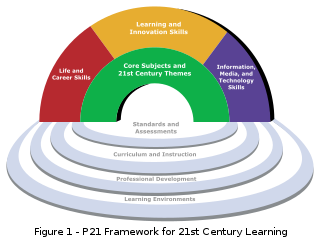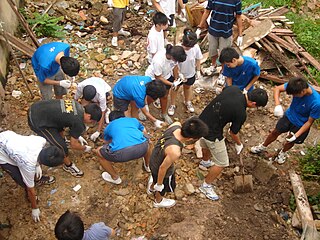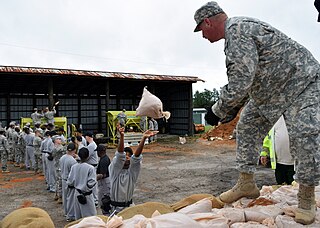 W
W4-H is a U.S.-based network of youth organizations whose mission is "engaging youth to reach their fullest potential while advancing the field of youth development". Its name is a reference to the occurrence of the initial letter H four times in the organization's original motto "head, heart, hands, and health" which was later incorporated into the fuller pledge officially adopted in 1927. In the United States, the organization is administered by the National Institute of Food and Agriculture of the United States Department of Agriculture (USDA). 4-H Canada is an independent non-profit organization overseeing the operation of branches throughout Canada. There are 4-H organizations in over 50 countries; the organization and administration varies from country to country.
 W
W21st century skills comprise skills, abilities, and learning dispositions that have been identified as being required for success in 21st century society and workplaces by educators, business leaders, academics, and governmental agencies. This is part of a growing international movement focusing on the skills required for students to master in preparation for success in a rapidly changing, digital society. Many of these skills are also associated with deeper learning, which is based on mastering skills such as analytic reasoning, complex problem solving, and teamwork. These skills differ from traditional academic skills in that they are not primarily content knowledge-based.
 W
WAL-Bairaq is a non-profit educational outreach program for high school students, allowing them to learn at the research environment in the Center for Advanced Materials (CAM) at Qatar University, in Doha, Qatar. Students engage in scientific activities which aim to enhance their skills and motivation, and guide them in their future career. Students attend modules in science, technology, engineering and mathematics.
 W
WThe American Competitiveness Initiative (ACI) is a federal assistance program intended to help America maintain its competitiveness through investment in research and development (R&D) and education. The ACI’s focus is on programs that are likely to strengthen U.S. competitiveness by targeting funding to agencies that support research in the physical sciences. NASA, however, is not included in the ACI.
 W
WThe Center for Advanced Materials (CAM) is an umbrella organization institute that hosts faculty members and researchers involved in materials research. It provides the opportunities for collaborative research projects between academic and industry experts as well between faculty members and students. The Center for Advanced Materials works under Qatar University's Office of Vice President for Research. The Center continues to expand its research profile both nationally and internationally through the establishment of a variety of research programs. In order to facilitate this type of high-profile research, its facilities, are constantly upgraded with the installation of major new equipment having the latest technology. It intends to have brighter, border-less innovations in the fields of Material Science and Engineering to help build a sustainable society in accordance with Qatar National Vision 2030 and to contribute to economic progress by developing advanced materials for new technologies, lowering the cost and enhancing the performance of more established technologies.
 W
WThe Education Program for Gifted Youth (EPGY) at Stanford University was a loose collection of gifted education programs formerly located within Stanford Pre-Collegiate Studies program. EPGY included distance and residential summer courses for students of all ages. Many of the courses were distance learning, meaning that courses were taught remotely via the Internet, rather than in the traditional classroom setting. Courses targeted students from elementary school up to advanced college graduate. Subjects offered included: Mathematics, English, Humanities, Physics, and Computer Science. Stanford Pre-Collegiate Studies is similar to the Center for Talented Youth at the Johns Hopkins University in terms of certain objectives. The EPGY courses themselves were offered by a number of institutions including Stanford and Johns Hopkins.
 W
WEvangelism Explosion (EE) is a Christian evangelistic ministry and training program.
 W
WFuture Problem Solving Program International (FPSPI), originally known as Future Problem Solving Program (FPSP), and often abbreviated to FPS, is a non-profit educational program that organizes academic competitions in which students apply critical thinking and problem-solving skills to hypothetical future situations. The program looks at current technological, geopolitical, and societal trends and projects those trends 20–30 years into the future in order to train students to develop solutions to the challenges they may face as adults. FPSPI was founded by creativity researcher Ellis Paul Torrance in 1974. Today, thousands of students from over 20 countries participate in the program each year. Most FPSPI components are open to students who are in the equivalent of the U.S. grade level range of 4 through 12.
 W
WThe Joy of Science is a popular video and audio course series, consisting of 60 lectures, each 30 minutes long, presented by Robert Hazen of the George Mason University and the Carnegie Institution of Washington. The course, first introduced in 2001, is part of The Great Courses series, and is produced and distributed by The Teaching Company, located in Chantilly, Virginia, in the United States.
 W
WLearning for Life (LFL) is a United States school and work-site based youth program that is an affiliate of the Boy Scouts of America. It utilizes programs designed for schools and community-based organizations that are designed to prepare youth for the complexities of contemporary society and to enhance their self-confidence, motivation, and self-esteem, and for careers.
 W
WProject Lead The Way (PLTW) is an American nonprofit organization that develops STEM curricula for use by US elementary, middle, and high schools.
 W
WService-learning is an educational approach that combines learning objectives with community service in order to provide a pragmatic, progressive learning experience while meeting societal needs.
 W
WSkillshare is an American online learning community for people who want to learn from educational videos. The courses, which are not accredited, are available through subscription.
 W
WSylvan Learning, Inc. consists of franchised and corporate supplemental learning centers which provide personalized instruction in reading, writing, mathematics, study skills, homework support, and test preparation for college entrance and state exams. Sylvan provides personalized learning programs and primarily serves students in primary and secondary education.
 W
WVirtual Portal for Impaired Groups Interaction (ViPi) is a project partially funded by the European Union (EU) under the Lifelong Learning Programme 2007–2013, subprogramme KA3 ICT. The project commenced on 1 January 2011 and has 36 months duration. The main vision of the project is to provide alternative and creative solutions for the employment of People with Disabilities (PwD) by delivering a "one-stop-shop" interactive portal and learning environment comprising: 1) a multilingual platform, 2) an embedded social community, 3) accessible content for PwD and trainers, etc. The project will bring together key stakeholders and gatekeepers in order to address the lack of specific training support or material for PwD and their trainers by providing a set of applications and services that will be available via a complete educational framework, taking into account interaction possibilities offered by web 2.0 and localised, tested and assessed with different end-user communities.
 W
WThe Youth Challenge Program is a program for at-risk youth run by the National Guard of the United States, which consists of Youth Challenge Academies in each participating state. The stated mission of the Youth Challenge Program is "to intervene in and reclaim the lives of at-risk youth to produce program graduates with the values, skills, education and self-discipline necessary to succeed as adults." The program accepts 16- to 18-year-old male and female high school dropouts who are drug-free and not in trouble with the law. The program lasts for 17½ months. The first 5½ months are part of the quasi-military Residential Phase. The last 12 months are part of the Post-Residential Phase. Most participants will earn their GED or a high school diploma by the end of their Residential Phase.